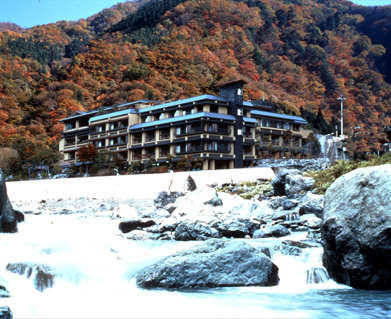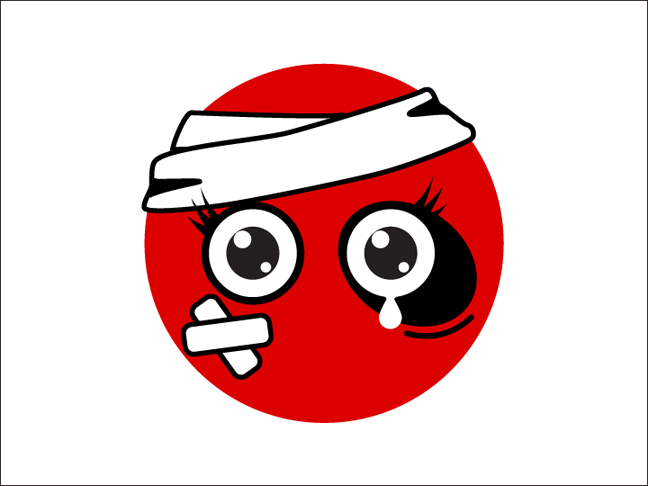Oldest Companies in the World
By Dyske February 17th, 2012
I was looking at my bottle of Kikkoman soy sauce, and noticed that it says, “Over 300 Years of Excellence.” “300 years” of anything is not something you see in any American products, so it stood out. I then became curious what the oldest company in the world is. In my mind, I was imagining European breweries. I Googled and found a Wikipedia page for List of oldest companies. To my surprise, Japan dominates that page. Japan has 3,146 firms that are over 200 years old. In comparison, the second place is Germany with 837 firms.
Another thing that surprised me was that many of these old businesses are hotels. I would not think hotel business is easy to sustain for a long period of time as it is easily affected by the trends in tourism as well as by the ups and downs of economy.
The photo you see on the right is of the hotel in Japan which is officially recognized as “the oldest hotel in the world” by the Guinness Book of World Records. Well, according to Wikipedia, it is not just the oldest hotel but it is the oldest company in the whole world. I would say that is a big difference. It’s been in business since the year 705. That’s 1,307 years old. “300 years of excellence” sounds like a trifling matter.
Another thing you notice about this list of oldest companies is that there are only about a dozen countries listed. It makes sense; it’s hard enough for a country to survive for that long, let alone businesses. Political instability too is another big factor even if the country itself survived. China, for instance, wouldn’t be there because of their Communism years. Japan was basically like Galapagos Island.
Update on the Cove Situation
By Dyske October 24th, 2011
I received this email below about Sea Shepherd:
Hello,
Please forgive my English. I found your blog yesterday while searching articles regarding the Cove. I totally agree that this is an issue of ethnocentrism rather than protesting for whaling or for killing Dolphins. The issue has gotten an extreme now. Please see this:
https://www.youtube.com/watch?v=6oVcLemp5jY
This is nothing but hatred. The fact that the Academy has awarded the movie the Cove an Oscar has given them more confidence in what they are doing to people in Taiji. I want to spread this as much as possible and make people realize how wrong they are to the people in Taiji. The people in Taiji do not deserve this. The anti-Whaling, anti-killing Dolphin people need to find another organizations or ways to achieve their goals but not by supporting Sea Shepherd.
Do you think you could in anyway (in your blog or through twitter) to raise a voice about this?
Thank you,
Noriko
Tokyo, Japan
All Look Same in Office
By Dyske June 9th, 2011
Great execution and production. In my 20s, I worked on the trading floor of a British bank where there was another Asian guy named Sonny. A white guy named Steve used to call me Sonny and I just went along with it, and let him call me Sonny. One day, another trader who was sitting near him noticed and said, “Wait, did you just call him ‘Sonny’? That’s not Sonny, that’s Dyske.” He apologized profusedly but I thought it was pretty funny. At the Christmas party that year, the head trader got all the Asian men on the stage and asked Steve to point to Sonny. It was pretty funny.
How to Raise Asian-American Children
By Dyske May 15th, 2011
The short answer is: I don’t really know. I don’t think anyone knows. So we need to make our best guesses, and that is what I would like to do below. Let me divide us Asian-American parents into two schools of thought. One school believes that we should teach our children whatever we know about our Asian heritage, which includes language, culture, values, customs, etc.. The other school believes that we should do our best to raise our children as Americans. Naturally, there are a lot of people who fall somewhere between the two extremes. Let’s call the first school, “bi-cultural school” and the latter “assimilation school”.
Statistically I’m not sure which school is more popular, but my own anecdotal evidence suggests that bi-cultural school is significantly more popular, at least among the first generation (immigrant) Japanese parents. My daughter attends a public school here in New York City and there are many Japanese parents. I’m one of the few parents who does not send their kids to Japanese schools on weekends, and I may be the only parent who does not teach Japanese to his child. Even my own parents are baffled by the fact that I do not. If my family was living in Japan, I would certainly teach my child English. The reason why I don’t teach my child Japanese has to do with the specific time in history and the context that my child will grow up in. Needless to say, I’m in the assimilation school.
Last week, New York Magazine published a thought-provoking article entitled “Paper Tigers – What happens to all the Asian-American overachievers when the test-taking ends?” The article meticulously analyzes what Asian-Americans experience in this country. The author, Wesley Yang, is a second generation Asian-American, and I do not believe he has a child. He writes from a point of view of a child and a victim. If he were a parent, he could not be so one-sided, since he would be partly responsible for what his children experience in the world. Although he covers a wide range of issues, parenting is left out.
Towards the end of the article, Yang reveals his own opinions of how Asian-Americans should behave in this country. He suggests that we behave more like the Americans. We shouldn’t be shy about getting (or demanding) what we want, but at the same time he suggests we should not do so by assimilating into the white-dominant culture, i.e., what white people find pleasant, comfortable, desirable, or appropriate.
Read the rest of this entry »
Ganbare Nippon! — Video Message from NYC Kids to Japan
By Dyske March 22nd, 2011
On March 18, 2011, the school my daughter attends, The Neighborhood School (PS363) in New York City, hosted a fundraising event for the victims of the Japanese earthquake and Tsunami. At the event, we filmed the students cheering for Japan, “Ganbare Nippon!”, which means “Don’t give up, Japan” or “Go Japan Go!”.
Japan Needs Your Support
By Dyske March 17th, 2011
What Japan needs right now, more than anything else, is your emotional support. If you are a foreigner living in Japan, and want to get out of there, then just get out, but don’t spread hysteria or panic, since that only makes things worse. (Yeah, thanks a lot Gregory Jaczko!)
Japanese Animation About the Current Nuclear Disaster
By Dyske March 17th, 2011
It’s funny and sad at the same time. I’m not sure if this was made for kids or adults either. It likens nuclear reactors to kids with bellyache. It is trying to explain that the reactors are right now farting, but not pooing.




